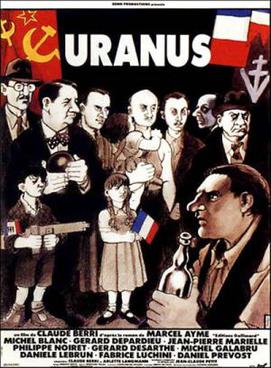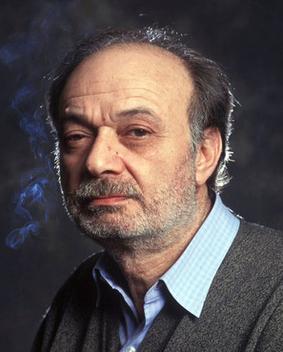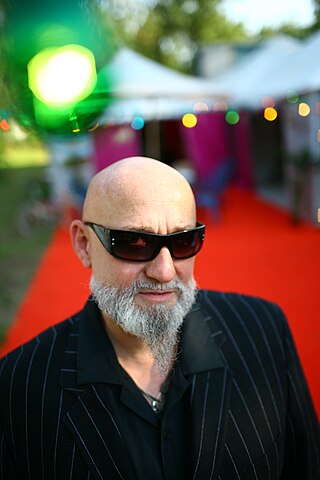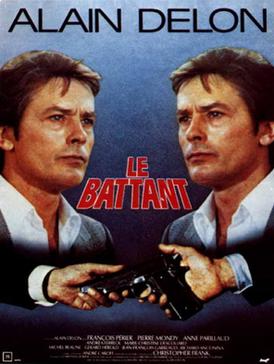
Christophe Guy Denis "Christopher" Lambert is a French-American actor, producer, and writer. He started his career playing supporting parts in several French films, and became internationally famous for portraying Tarzan in Greystoke: The Legend of Tarzan, Lord of the Apes (1984). For his performance in the film Subway (1985), he received the César Award for Best Actor. His other notable acting roles include Connor MacLeod in the adventure-fantasy film Highlander (1986) and the subsequent franchise of the same name, Raiden in Mortal Kombat (1995), Methodius in Ghost Rider: Spirit of Vengeance (2011), and Arne Seslum in Hail, Caesar! (2016). He also served as executive producer for Nine Months (1995).

Uranus is a 1990 French comedy-drama film with Gérard Depardieu about post-World War II recovery in a small French village, as the controlling French Communist Party tries to dispose of Pétain loyalists.

Michel Gérard Joseph Colucci, better known under his stage name Coluche, was a French stage comedian and cinema actor. He adopted Coluche as a stage name at age 26, when he began his entertainment career. He became known for his irreverent attitude towards politics and the establishment, and he incorporated this into much of his material. He was one of the first major comedians to regularly use profanities as a source of humor on French television. He also founded the charity "Les Restaurants du Cœur" which still provides free meals and other products to people in need.

Renaud Pierre Manuel Séchan, known as Renaud, is a French singer-songwriter.

Claude Berri was a French film director, writer, producer, actor and distributor.

Sylvette Herry, known professionally as Miou-Miou, is a French actress. A ten-time César Award nominee, she won the César Award for Best Actress for the 1979 film Memoirs of a French Whore. Her other films include This Sweet Sickness (1977), Entre Nous (1983), May Fools (1990), Germinal (1993), Dry Cleaning (1997) and Arrêtez-moi (2013). In her career she has worked with a number of international directors, including Michel Gondry, Bertrand Blier, Claude Berri, Jacques Deray, Patrice Leconte, Joseph Losey and Louis Malle.

Antoine de Caunes is a French television presenter, actor, writer and film director. He is the son of two prominent French personalities, television journalist-reporter Georges de Caunes and television announcer Jacqueline Joubert. He is the father of the actress Emma de Caunes.

Police is a 1985 French neo noir crime drama film directed by Maurice Pialat and starring Gérard Depardieu, Sophie Marceau, and Sandrine Bonnaire. Written by Catherine Breillat, the film is about a moody, jaded police detective investigating a drug ring who falls for a mysterious woman and is drawn into a shady and dangerous scheme. The film had 1,830,970 admissions in France.

Bruno Nuytten is a French cinematographer turned director.
The 9th César Awards ceremony, presented by the Académie des Arts et Techniques du Cinéma, honoured the best French films of 1983 and took place on 3 March 1984 at the Théâtre de l'Empire in Paris. The ceremony was chaired by Gene Kelly and hosted by Léon Zitrone. Le Bal and À nos amours tied for the award for Best Film.

Richard Anconina is a French actor. He won the César Award for Best Supporting Actor in 1983, and for Best Actor in 1989.

Jacques Dezandre, better known by his stage name Gogol Premier, is a French punk rock singer.

Série noire is a 1979 French crime film directed by Alain Corneau, based on the novel A Hell of a Woman by Jim Thompson, that stars Patrick Dewaere, Marie Trintignant and Bernard Blier. It tells the story of an inadequate young man whose relationship with his wife has deteriorated and who falls for a teenage prostitute. To win the girl, he commits robbery and murders. The film was entered for the 1979 Cannes Film Festival.
Itinerary of a Spoiled Child or Itinéraire d'un enfant gâté is a 1988 French film directed by Claude Lelouch.

Raïna Raï, is an Algerian raï band from Sidi Bel Abbès. It formed in 1980 in Paris and continues to this day.
The founding members are Tarik Naïmi Chikhi, Kaddour Bouchentouf, Lotfi Attar and Hachemi Djellouli.

Charlélie Couture is a French and American musician and multi-disciplinary artist, who has recorded over 25 albums and 17 film soundtracks, and has held a number of exhibitions of paintings and photographs. He has also worked as a poster designer, and has published about 15 books of reflections, drawings and photographs.

Le Battant is a 1983 French crime thriller film starring and directed by Alain Delon.

The Heart on the Sleeve is a 1948 French comedy film directed by André Berthomieu and starring Bourvil, Michèle Philippe and Jacques Louvigny. It was shot at the Billancourt Studios in Paris and on location in the city. The film's sets were designed by the art director Raymond Nègre. It had admissions in France of 3,657,951.
Love Songs is a 1984 comedy-drama romance film directed and written by Élie Chouraqui and starring Catherine Deneuve and Christopher Lambert. It is also the film debut of Charlotte Gainsbourg.
















